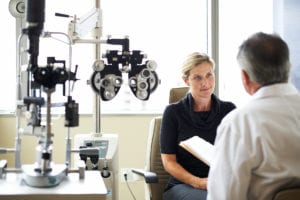
High Blood Pressure and Eye Health
Like the rest of the body, the eyes rely on a healthy circulation of blood to hydrate and nourish anatomy. The blood vessels that exist in the eyes are extraordinarily small, making them also incredibly fragile. Any increase in intraocular pressure or pressure within the veins of the eye can lead to irreparable damage; damage that occurs without symptoms until the eye has been severely injured.
The eye condition related to high blood pressure is referred to as hypertensive retinopathy. This condition is found in one of two ways, either through a dilated eye exam or due to severe vision impairment.
A dilated eye exam looks at the very back of the eye, at the retina, where light lands after entering the front of the eye. Hypertensive retinopathy may be observed as swelling in the center of the retina (macular edema), narrowing in the blood vessels on and around the retina, micro-hemorrhages from retinal blood vessels, or swelling in the tissue surrounding the optical nerve.
If symptoms such as cloudy vision, double vision, or sudden vision loss occur, there may be no way to reverse the damage caused by hypertensive retinopathy.
Prevention Truly is the Best Medicine
We have heard the phrase “prevention is the best medicine” for so many years that we may pay little attention to the truth of the matter. When discussing high blood pressure as it relates to long-term eye health, though, there truly is no better approach. Adults with a family history of high blood pressure should maintain yearly checkups with their doctor to keep a close eye on blood pressure. If numbers become elevated, strategies such as weight and stress management have demonstrated positive results at lowering blood pressure. Finally, annual eye exams are vital to understanding risks and the current status of the delicate parts of the eye.
Get to know your eyes better. Call our Ocala office at (352) 237-8400 to schedule your comprehensive eye exam.
